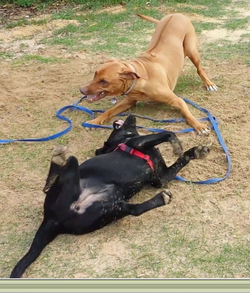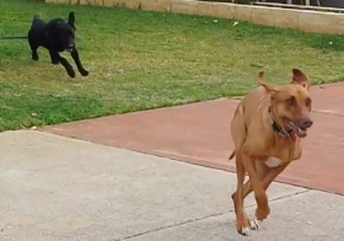
The minute Scout arrived, I set about choreographing daily life to give Zuri and Scout the best possible chance of getting along. Scout is a wiggly, in-yah-face, barky, playful ball of exuberance. At all hours. In all places. Zuri is calm, respectful of space and prefers to observe before making an acquaintance. Good Lordie, what was I thinking trying to bring these two together? I was counting on past experiences and knowing that Zuri does enjoy the company of other dogs – given the right circumstances. Once she feels confident (safe?), she plays with joyful gusto.
So our dance began:
* Baby gates.
* Closed doors.
* Separate feeding.
* Tethering Scout (whilst I was present) to prevent unwanted advances on Zuri.
* Occupying Scout with alternatives to accosting Zuri (treat dispensers, Treat and Train, carrots to chew, training sessions, car rides, shopping trips, one-on-one time).
* Routines, routines, routines. For example, when coming home with Scout, leaving her in the car while I greet Zuri first minus a bouncing puppy, then bringing Scout inside on lead.
* Avoiding situations where Scout-the-Ninja would come out of nowhere to an unsuspecting, sleepy Ridgeback (especially in hallways, doorways and any transition areas).
* Reinforcing for any pro-social behaviours Zuri showed around Scout e.g. looking at Scout, simply entering the room if Scout was already in there, coming outside if Scout was there, standing still if Scout began sniffing her. It was a most vigorous schedule of Differential Reinforcement of Other (DRO) behaviours, instead of avoidance and escape. It had no other outcome but to make hanging out with Scout a cool idea. Zuri even started coming out the back on Scout’s toilet stops.
* Reinforcing any ‘polite’ behaviours Scout showed towards Zuri e.g. looking at her briefly (instead of staring or nose bopping), coming away immediately when called, waiting patiently while Zuri was fed a treat before getting hers. Again, a really high rate of reinforcement for a wide variety of desired behaviours. This was also done on lead at first to prevent Scout practising unwanted behaviours and to protect Zuri, giving her no need to seek escape or take other action. The lead was removed when Scout became more reliable.
We had some accidents. Zuri was dive bombed by a Kamikaze puppy in the narrow, dark hallway when a door was opened. Zuri's sleep-in was rudely interrupted by a whirlwind of puppy playfulness bombarding the bed. I learnt from these incidents to be more careful with the ‘zones’ and to prevent incidents rather than go into damage control after the fact.
After eight days, no signs of reciprocal play were in sight. The longest it had taken Zuri to play with a new house guest in the past had been four days. I tried to think of all the things in the environment that may have been different with these other dogs compared to Scout (and Turbo). One difference was that the other houseguests, except for Turbo, had slept in their crate in our bedroom. Maybe a simple change in the environment, bringing Scout from the laundry into the bedroom to sleep, might have an effect. So I tried it.
Did all this have any effect? On the 12th day, after four nights sleeping in the bedroom, Scout and Zuri broke into spontaneous play out in the front yard. Maybe it was just the extra time. Or maybe it was actually precipitated by the sleeping arrangement: Zuri being able to see, hear and smell Scout in a relaxed environment for a prolonged period with no chance of ambush. Was a positive association being made in a safe environment? Maybe it was the ample space out the front. Maybe it was a combination of any or all of these, or some I haven't even thought of.
I hadn’t planned the play and was simply teaching Scout on a long lead while Zuri was wandering around getting her random treats for being in the presence of the crazy black dog. I was ecstatic! Mutual play is an excellent sign that two dogs are going to get along. It must be mutual. Many dogs look like they are playing when in fact one is trying to escape or avoid the contact of an insistent partner. What was even more impressive was how beautifully Scout modified her play style to suit Zuri’s preference. It meant she was listening to Zuri’s signals and adjusting. Scout is a barker and a head banger: every time she barked or banged her nose into Zuri, Zuri turned away, looked away or paused. Scout soon realized that play was more continuous if she didn’t bark into Zuri’s face or bulldoze her. They both loved to chase and run, to play bitey-face with well controlled bite inhibition and to wrestle. They both took breaks and mirrored each other with a shake off. Scout was actually better at being recalled from play than Zuri. I must work on that! Email subscribers can watch here.
On day 19 they broke out into play in the back yard. Only for a few seconds, yet my heart leapt. The breakthrough came later that day inside, when Scout’s play stares were answered with a play bow from Zuri and it was on. It was cautious at first, with Zuri looking at me often when Scout was getting too rough – which melted my heart because it seemed as if she was seeking my assistance. I helped settle things in a light-hearted way rather than by yelling or saying “no” – I wanted them to enjoy play, not superimpose the threat of anything aversive from me when they were playing. So I would pause the play with a recall or by distracting Scout with a butt scratch or by throwing a toy, or simply letting Zuri hide behind me until she was ready to resume. The whole experience needed to be as enjoyable and stress-free as possible. Email subscribers can watch here.
All in all, I was overjoyed to witness them playing – even if the lounge looked like a pillow cannon had gone off! Compatible play bodes well for a more relaxed cohabitation in a two-dog household. Scout seemed calmer. She even chewed less. Zuri seemed less tense and was around more. It also meant that if I couldn't be bothered taking them for a walk, I could palm them off with, "Go play with your sister!"


 RSS Feed
RSS Feed